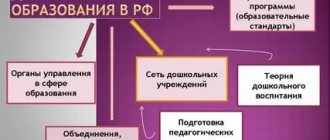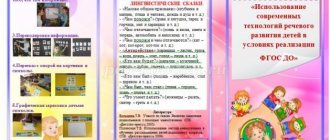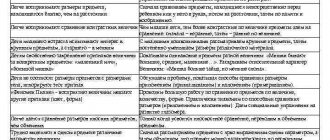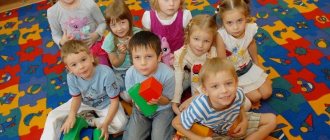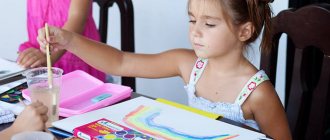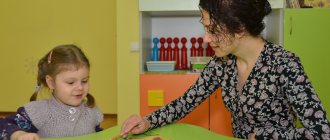Modern trends in preschool education
In accordance with the decision of the Council, the draft Federal State Educational Standard for preschool education was finalized and submitted for re-consideration. Based on the conclusions of 11 expert organizations and the recommendations of the working group of general education, the Council of the Ministry of Education and Science of the Russian Federation on federal state educational standards on August 28, 2013 decided to approve the Federal State Educational Standard for preschool education .
The introduction of the Federal State Educational Standard for Educational Education into practice will require the implementation of a number of activities, determining their nature and sequence.
Modern trends in the development of preschool education must first of all include:
Humanization of education – consideration of the child’s personality as the highest value of society, emphasis on the formation of a citizen with high intellectual, moral and physical qualities. And although the principle of humanization is one of the traditional general didactic principles, at the present stage of development of education its implementation is ensured by other conditions, first of all, the complexity of traditional and new trends in the functioning of the educational system.
Individualization as an effort is another traditional didactic principle of the need for an individual approach.
The implementation of this principle is manifested, first of all, in the organization of a personal-activity approach in education. The emergence of such an integrated, systematic approach to the upbringing and education of children is due not only to the natural development of pedagogical science, which, like any area of human activity, is characterized by a constant desire for progress, but also to the urgent crisis of the existing education system. A feature of this approach is the consideration of the learning process as a specific form of subjective-subjective relations between teacher and student. The very name of this approach emphasizes the relationship between its two main components: personal and activity.
The personal (or personality-oriented) approach assumes that the student with his individual psychological, age, gender and national characteristics is at the center of learning. Within the framework of this approach, training should be built taking into account the individual characteristics and “zone of proximal development” of the student. This consideration is manifested in the content of educational programs, forms of organization of the educational process and the nature of communication.
The essence of the activity component is that education contributes to the development of the individual only if it encourages him to take action. The significance of the activity and its result influences the effectiveness of a person’s mastery of universal human culture. When planning educational activities, it is necessary to take into account not only the general characteristics of the activity (objectivity, subjectivity, motivation, purposefulness, awareness), but also its structure (actions, operations) and components (subject, means, methods, product, result).
Without the cult of the teacher. 10 trends in private preschool education
Zhanna Kazanskaya
Why do some parents send their children to private kindergartens and what do they expect? The reasons may be different, but, as a rule, parents are confident that in a private kindergarten there will be a higher quality of education, and most importantly, an individual approach to the child (groups there are not 25 people). The founder of a network of private kindergartens, Zhanna Kazanskaya, talks about the main trends in the field of private preschool education.
Useful Mela newsletter twice a week: Tuesday and Friday
SUBSCRIBE
If we look at the results of 2022, we can say that the market for children's services and goods is developing quite actively. If we talk about education, then a large number of private children's educational projects are emerging - both in the center of Moscow and in residential areas and especially cottage villages, where the demand for them is quite high. In terms of leisure time, children's infrastructure also does not stand still and develops on a par with adults. For example, shopping centers have become more and more active in offering options for entertainment and educational programs for children, and devoting more and more space to the children's area.
The only task is to figure out what will be most in demand.
If we talk about private gardens, their format and content are completely different: from full-fledged ones - with their own kitchen and area for walking - to tiny leisure centers for children's day care.
This recent growth is due to several reasons. Firstly, entrepreneurs realized that the children's niche is extremely promising, and secondly, the positive dynamics are associated with the increased interest of parents and the penetration of business processes into this area.
Today in Moscow, 8% of parents use the services of private kindergartens. This figure is quite large, considering the fact that several years ago this figure was reduced to only 1-2%. There are approximately 800 private gardens in the capital, and there are prospects for growth.
Modern parents are becoming more and more demanding regarding private preschool education
Their requests priorities change. Being inside the market, we tried to highlight the main trends in the development of private kindergartens that could be observed this year.
Main trends in the development of private kindergartens
1. The concept of gardens, in which conditions are as close as possible to home ones, is actively gaining popularity
. The number of children in them is limited to 10. This is due to the desire of parents to provide their child with comfort and safety, and most importantly, the attention of educators.
2. Refusal of private gardens from an oversaturated and super-intensive program towards a modular approach
. This allows the child to choose what to do, and teachers to take into account and reveal his individual characteristics. Today, parents are most interested in activities that are related to the development of the child’s emotional intelligence. The focus is on the period of “preschool childhood” itself and the child’s full experience of it, and not just the stage of preparation “for the future life.”
3. The emergence of many original educational methods in private gardens.
Today, parents give priority to combined programs that combine several approaches from different schools (Maria Montessori, Cecile Lupan, Waldorf, etc.).
4. Owners of private gardens are looking for teachers of a new format
. The idea of the “cult” of the teacher is gradually being destroyed. Managers strive to offer a unique system of knowledge, and this requires teachers who are ready and willing to work in a team.
5. Private gardens are actively developing additional services
. They can be used not only by pupils, but also by parents who want to get acquainted with the institution or cannot afford to pay for a child’s daytime visit. A large number of sections, clubs and classes appear. These are art lectures, sports sections, language classes, etc.
6. Children have become different over the past three to five years.
They live in another world, where the speed of transmitting and receiving information is very high. If a child needs to know something, he just needs to type a question in a search engine, and he will instantly receive an answer. Something must motivate the child to search for this knowledge; interest must awaken in him.
Preschool pedagogy in the education system at the present stage
Bibliographic description:
Toropova, N. D. Preschool pedagogy in the education system at the present stage / N. D. Toropova. — Text: immediate // Current issues of modern pedagogy: materials of the VIII International. scientific conf. (Samara, March 2016). - Samara: ASGARD Publishing House LLC, 2016. - P. 115-118. — URL: https://moluch.ru/conf/ped/archive/188/9795/ (access date: 01/03/2022).
Preschool pedagogy is a branch of pedagogy that studies the patterns of development, upbringing and elementary forms of education of children at the age before entering school.
Preschool pedagogy is the science of the patterns of development and personality formation of preschool children. Currently, it is developing didactics of preschool education, theory and methods of educating preschool children, international standards for preschool child development, theory and practice of professional training of specialists in preschool education and upbringing.
Preschool pedagogy is based on the methodology of general pedagogy. Its main objectives are: research into historical trends in the development of views on preschool childhood and preschool pedagogy; studying foreign experience in preschool education and upbringing; development of didactic foundations for preparing a child for school in different periods of preschool childhood; study of pedagogical patterns of formation and development of mental properties, cognitive and emotional-volitional processes in a child in preschool age; development of theoretical foundations for raising a preschool child in the process of learning, communication, and educational games; studying the ways and conditions for effective intellectual and physical development of preschool children;
The current state of the organization of preschool education in Russia.
For many parents, the main argument in favor of their child attending kindergarten is the fact that kindergarten today provides free continuous education and high-quality preparation for school, since it has the necessary specialists and professional teachers.
In a preschool institution, the foundations of a healthy lifestyle are laid, since the conditions necessary for the physical, mental, spiritual, moral and social development of children are created here.
The modern system of domestic preschool education is built on the principles of dynamism, variability of organized forms, flexible response to the needs of society and the individual, and is characterized by the emergence of new types of educational institutions for children and a variety of pedagogical services. Among the factors influencing the effectiveness and quality of education of children in a preschool educational institution, an important role belongs to the educational program. It is a guideline for the creative activity of educators: it determines the content of the educational process in a preschool educational institution, reflects the worldview, scientific and methodological concept of preschool education, and records its content in all main areas of child development.
The level of psychological and pedagogical literacy of parents has increased significantly. Their requirements for the education, upbringing and development of children in the preschool period have changed. Parents want to be active participants in the pedagogical process; they are ready to participate in the implementation of the preschool education program. Currently, parents are given the right to independently determine when their child starts school. As a result, some parents - supporters of the acceleration of child development - feel the need to intensively prepare their child for school from the age of 6.
At the present stage, the first place is not teaching a preschooler to read, write, count, foreign language, etc., but the formation of functional readiness for schooling and social maturity. Thus, in recent years, a new term “pre-school education” has come into use.
Among the latest legal documents in the field of education of preschool children, the Federal State Educational Standard for Preschool Education is the main one. The introduction of the Federal State Educational Standard for Preschool Education, based on a scientifically verified strategy for the modernization of preschool education, makes it possible to determine the importance of preschool education in the general continuous education system. It sets new coordinates for the development of preschool education and identifies criteria for its quality.
For the first time in the state, the theory of political child-centrism is proclaimed - when the adoption of any government decisions is associated with childhood. Let the child play enough, create a decent developmental environment for him, help him develop in it, while not being above the child, but together, next to him. Develop motivation in a child - “I want to find out!” Allowing children to speak, think independently, look for answers to questions, instill in children a thirst for discovery in acquiring knowledge - this is the main task of preschool education, which has now become the first stage of education.
In the Federal State Educational Standard for Education, special emphasis is placed on creating a system of conditions for the socialization and individualization of children as a “minimum program” and their development as a “maximum program,” while the condition for creating a developing educational environment is put forward as a mandatory condition.
A modern preschool teacher must be competent:
in organizing events aimed at strengthening the health of pupils and their physical development;
organization of various types of activities for students;
interaction with parents (legal representatives) of students and employees of the educational organization;
methodological support of the educational process;
implementation of information and communication technologies;
ensuring inclusive approaches in working with preschoolers with special educational needs, including those with disabilities.
The use of information and computer technologies in preschool education allows teachers to change the content, apply new non-traditional methods and organizational forms of teaching.
The opportunities provided by network electronic resources allow us to solve problems that are relevant for specialists in the preschool education system:
- additional information
- a variety of illustrative material
the opportunity to disseminate new methodological ideas and teaching aids
the ability to transmit and receive information in the process of working with parents if the child, for any reason, does not attend kindergarten.
The use of Internet resources allows teachers to take part in interregional and international conferences, webinars, seminars and competitions.
It is very important to form an information culture in children.
When using Information resources in working with preschoolers, it is necessary to be guided by the “Methodological Recommendations” on limiting in educational organizations students’ access to types of information distributed via the Internet that are harmful to the health and (or) development of children, and also do not correspond to the objectives of education.
One of the most important tasks of modern preschool pedagogy is caring for the health of the child. Modern society is increasingly placing demands on the physical, mental, and personal development of children. Preserve the health and intelligence of the nation at the present stage. There is an increasing need for preschool teachers to implement technologies aimed at preserving and strengthening the health and development of the psychophysical potential of preschool children, intensifying motor activity, which will ensure the successful adaptation of children to the multidirectional loads of school education. The implemented technologies help to form strong motivation for a healthy lifestyle among preschoolers, their parents, and teachers.
In the Federal State Educational Standard, preschool education reveals the essence of motor activity implemented in the direction of “Physical Development”. Health-saving technologies in the continuous physical education activities of preschoolers are aimed at solving the priority task of preserving, maintaining and enriching the subjects of the pedagogical process of preschool educational institutions and primary schools: children, teachers and parents. Modern health-saving technologies reflect two lines of health-improving and developmental work: introducing children to physical education; use of developmental forms of health-improving work with children. The goal of health-saving technologies in preschool education is to ensure a high level of real health for children and the education of physical education, which allows preschoolers to independently solve the problems of a healthy lifestyle and safe behavior.
Particular attention should be paid to the system of interaction between a preschool educational institution and a school in the context of continuous education.
Preparing a child for school begins long before he graduates from a preschool educational institution. The child's first teacher is the teacher. The Federal State Standard for Preschool Education defines a set of mandatory requirements for preschool education and determines the main guidelines for the implementation of the educational program.
The Program's targets serve as the basis for the continuity of preschool and primary general education.
In connection with the introduction of Federal State Standards for Preschool Education, cooperation between a preschool educational institution and a school is considered as an important condition for the effective preparation of children for the transition to student status. Therefore, it is necessary to develop a plan of specific activities, which should define goals, objectives, an organizational and methodological block containing a detailed list and description of targeted work with children, parents, social and medical institutions and the expected result.
In the process of interaction, the educator and teacher exchange pedagogical experience, find optimal methods, forms of work, etc. The educator provides detailed information about each child, about the characteristics of the development, upbringing and education of each child, his interests, individual characteristics, capabilities, character. The teacher introduces the features of the primary school program and the factors that impede easy adaptation to the conditions of a mass school.
A combined kindergarten and primary school base is being created. This allows for a continuous process of development, upbringing and education of the child, thereby ensuring continuity of the two stages of education.
One of the objectives of the “Federal State Standard of Preschool Education” is to ensure the continuity of the goals, objectives and content of education implemented within the framework of educational programs at various levels (continuity of the main educational programs of preschool and primary general education).
The Federal Law “On Education in the Russian Federation” notes that educational programs of preschool education are aimed, among other things, at achieving the necessary and sufficient level of development for children to successfully master educational programs of primary general education. That is, the problem of continuity can be solved successfully only with close cooperation and interaction between the educator and the teacher.
The development of education can be carried out on its own, but is effective only if it is managed and improved in management processes, based on a scientific approach.
Reform plays a significant role in improving education management. And this is the main factor in education management today.
The concept of “quality of preschool education” is analyzed based on three different aspects. In the national aspect, the quality of preschool education can be determined by the measure of its adequacy to the socio-economic conditions of society. Here, the quality of preschool education comes into contact with such aspects as the standard of living, the economic potential of the country, etc. In the social aspect, it is determined by the compliance of educational services with the real request of parents. The quality of preschool education in the pedagogical aspect may mean the implementation of the principle of variability in education, the transition to personality-oriented interaction between the teacher and children.
The concept of “quality” is multifaceted and is interpreted differently from the perspective of each participant:
For children, this is learning in a fun way for them.
For parents, this is the effective education of children, that is, training in programs that well prepared their children for school;
- For teachers, this is a positive assessment of their activities by the head of the preschool institution and parents.
The quality of education is in constant flux. Therefore, today it is very important to predict possible changes in quality, to investigate the reasons and nature of this change.
“Childhood” is preparation for the future life of a child, which is unique and of great importance in his development.
The period from birth to entry into school is the age of the most rapid physical and mental development of the child, the initial formation of mental and physical qualities necessary for a person throughout his life. In other words, educating a preschool child is like laying the foundation of a huge building. It is on this basis that character, skills, and abilities will be built and developed in the future. Of course, it is worth making sure that this foundation is strong and reliable.
Literature:
- Federal Law of December 29, 2012 No. 273-FZ “On Education in the Russian Federation”
- Order of the Ministry of Education and Science “On approval of the federal state standard of preschool education” dated October 17, 2013 No. 1155
- Decree of the Government of the Russian Federation “On the national doctrine of education in the Russian Federation” dated October 4, 2000 No. 751
- Burshit I.E. On the issue of continuity of developmental education.
- Denyakina L. M. On the development of uniform requirements for the content of preschool education
Key terms
(automatically generated)
: preschool education, child, preschool educational institution, kindergarten, preschool pedagogy, preschool age, healthy lifestyle, primary school, primary general education, parent.
Current trends in the development of preschool pedagogy
Definition 1
Modern preschool pedagogy is a branch of pedagogical science that determines the procedure for the optimal organization of training and education of young children, taking into account the modern requirements of the socio-economic development of society.
The development of preschool pedagogy, like any scientific field, is directly related to the stage of social development, its dynamics and trends. Science cannot develop in isolation from society and its trends.
In this regard, the main directions of development of preschool pedagogy at the present stage are the following:
- Pedagogy of development. This direction is based on shifting the emphasis to developmental education and upbringing of preschoolers. Training should not be routine and simple assimilation of theoretical information. Children need to be introduced to cultural values, develop their creative potential and be helped in its practical implementation. The child develops and, at the same time, gives rise to new forms of culture. The learning process involves relying on an interdisciplinary approach and creating a positive atmosphere that helps you learn and develop. Preschool education is carried out on the basis of a development program focused on cultural knowledge and assimilation of the culture of communication, behavior and activity, instilling aesthetic qualities of the individual. Education of the individual presupposes the need for its inclusion in the team and interaction with it. This opens up the possibility of resolving the problems of contrasting the individual with the social environment.
- Pedagogy of personality-oriented development. This direction involves placing the individual, his needs and interests at the forefront of the learning process. For this purpose, training is based on an individual approach. You cannot focus on a certain standard that must be achieved. Each child is unique, has specific developmental characteristics, skills, abilities and capabilities. Also, the age dynamics of preschool children’s development are taken into account. Each stage of age development is characterized by different abilities and capabilities for perceiving and assimilating information. The child becomes a subject of development. His personality must be respected and valued. Training should exclude authoritarianism and be built on the basis of partnership and cooperation.
- Humanitarian pedagogy. In this direction, the self-worth of childhood is a priority in the development of the child. Childhood is the stage through which a child enters the world of culture. The educational process is based on the development of the activity of the child’s personality, mastering independence skills, and performing independent actions in learning and work. There is a joint action of the humanitarian, cultural, subjective approach, which acts as a mechanism for the child to master cultural experience at the preschool stage of development.
- The family is recognized as the main social institution necessary for the development of the child. Family education is recognized as the foundation on which personal development, the development of its basic qualities and the realization of creative potential are built.
- The personality of the teacher is currently the basis for organizing quality teaching and education. It is subject to more stringent requirements. Teachers must continuously improve their skills and abilities, their qualifications and level of professionalism. Therefore, the state creates opportunities for continuous training and development of teachers, their personal growth. Policy in the field of education introduces teacher training programs, courses and internships, evening training, incentive payments are introduced for teachers engaged in self-education, attending courses and participating in additional training and advanced training programs.
Are you an expert in this subject area? We invite you to become the author of the Directory Working Conditions
